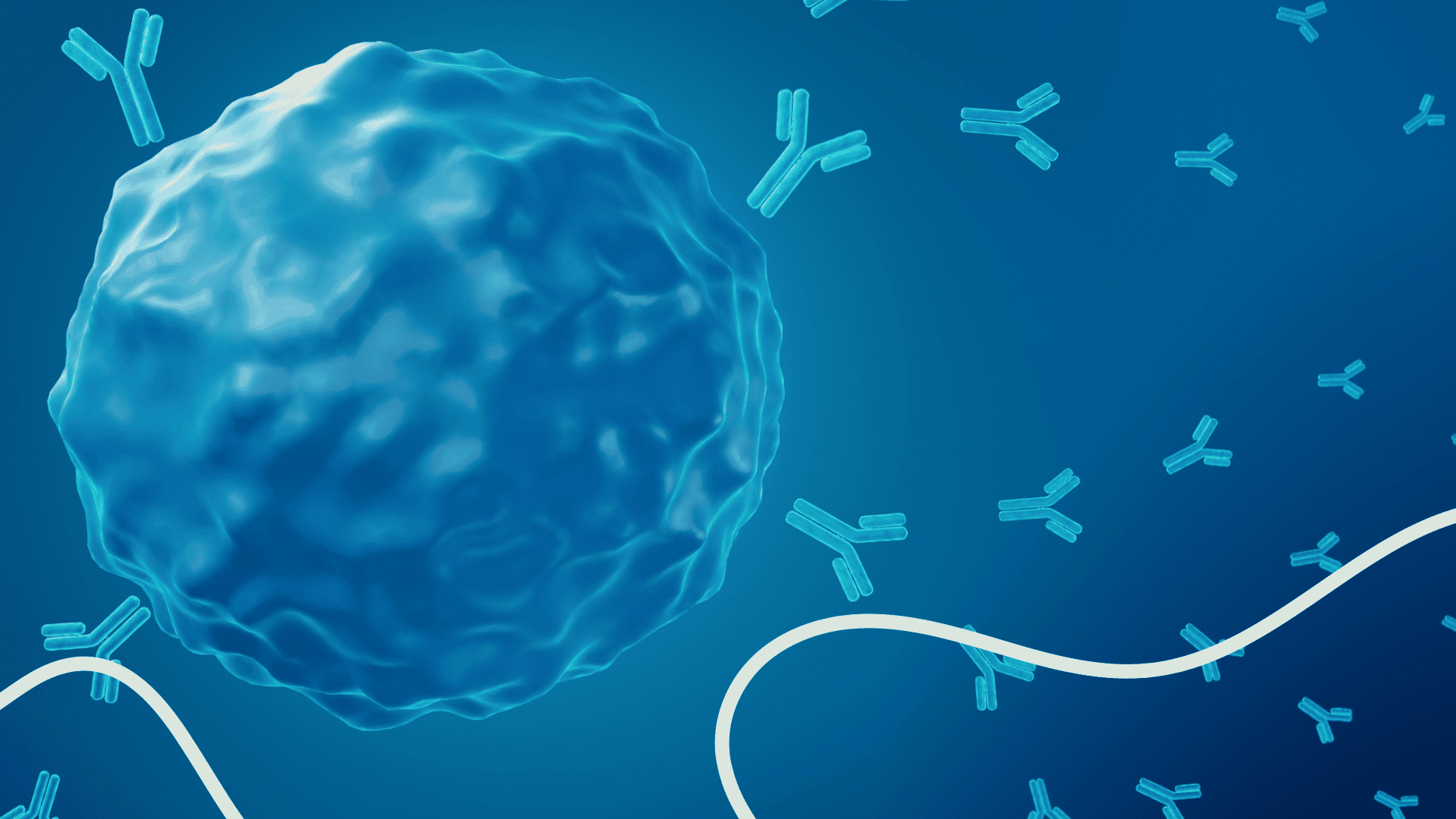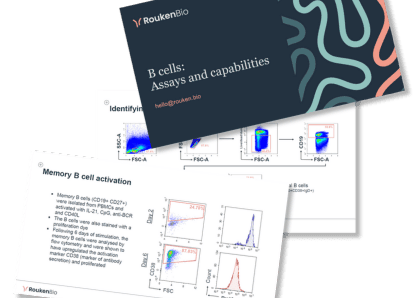B Cell Assays
At RoukenBio, we provide comprehensive B-cell assays to support your research in immunology, vaccine development, and therapeutic antibody production. Our advanced techniques allow for detailed phenotypic assessment, isolation of specific B-cell subsets, and functional analysis of B-cell activities.

Why B cells?
B cells are key players in the adaptive immune response and are responsible for mediating humoral immunity. The primary function of B cells is the production of high-affinity antibodies and the generation of immunological memory. As professional antigen presenting cells, B cells are also able to acquire specific antigens via their BCR and secrete cytokines to help direct the wider immune response. Due to their association with a variety of diseases including B cell lymphomas and antibody driven autoimmune diseases, B cells are an attractive therapeutic target in a number of different modalities.

Explore our B cell Assays
B cell Phenotyping
B cell activation
Secreted cytokine and antibody assessments
Identification of antigen-specific B cells
B cell depletion
B cell functional assays
B cell Phenotyping
Phenotypic characterization of B-cells via flow cytometry is applicable to immunophenotyping, disease research and biomarker discovery. PBMCs or isolated pan B cells can be screened for the presence of specific B cell subsets including naïve B cells, transitional B cells, marginal zone B cells, plasmablasts, unswitched B cells and memory B cells. These populations can be enriched using magnetic bead sorting or fluorescence-activated cell sorting (FACS) to perform targeted research on specific B-cell subtypes, therapeutic development and cellular assays.
Identifying B cell subtypes:

Memory B cells

Mature B cells

Transitional B cells
B cell Phenotyping
Phenotypic characterization of B-cells via flow cytometry is applicable to immunophenotyping, disease research and biomarker discovery. PBMCs or isolated pan B cells can be screened for the presence of specific B cell subsets including naïve B cells, transitional B cells, marginal zone B cells, plasmablasts, unswitched B cells and memory B cells. These populations can be enriched using magnetic bead sorting or fluorescence-activated cell sorting (FACS) to perform targeted research on specific B-cell subtypes, therapeutic development and cellular assays.
Identifying B cell subtypes:

Memory B cells

Mature B cells

Transitional B cells
B cell activation
The activation of B cells with soluble and membrane bound factors such as CPG, R848, anti-BCR, IL-21 and CD40L in the presence of candidate therapeutics is utilised to study changes in B cell phenotypes and maturation. These activation assays use flow cytometry to assess a variety of factors including:
- Surface and intracellular activation markers
- Proliferative responses
- Intracellular cytokine production
- Protein phosphorylation and transcription factor expression
- Metabolic markers
Memory B cell activation:

Isolated memory B cells are activated and stained using a proliferation dye. Following stimulation, cells analysed using flow cytometry showed proliferation and upregulation and activation of CD38.
Secreted cytokine and antibody assessments
B cells produce cytokines and antibodies in response to stimulatory and activation signals. The ability of candidate therapeutics to interfere or drive this process can be assessed using multiplex cytokine/antibody analysis or ELISA. Analytes that can be assessed include secreted cytokines such as IL-4, IL-6, IL-10, IL-14, IFN-α and IFN-γ and secreted immunoglobulin including total and antigen specific IgM, IgG (including subclasses) and IgA.
Assessing B cell Ig secretion:

PBMC isolated memory B cells were activated by cytokines and a CD40L expressing cell line (produced by RoukenBio) to induce Ig secretion. Therapeutics designed to enhance or repress antibody production can be assessed using this assay.
Identification of antigen-specific B cells
Antigen specific B cells can be used for the assessment of vaccine efficacy, the identification of disease biomarkers and for determining the impact of specific B cell targeting therapeutics. At RoukenBio we have developed an assay in which fluorescently tagged antigens (such as SARS-CoV-2) can be used to identify antigen specific B cells via flow cytometry. These cells can be phenotyped by flow cytometry or they can be isolated using a cell sorter and expanded for further downstream applications.
Identifying SARS-CoV-2 Spike S1 subunit reactive B cells:

Antigen reactive memory B cells were not present before March 2021. S1 reactive IgG+ memory B cells were detected from 2022 onwards in line with widespread vaccine roll out and sustained levels of transmission (proportions are typical for antigen specific memory B cells).
B cell depletion
B cell depletion is an attractive therapeutic strategy in the treatment of B cell lymphomas and autoimmune conditions that are driven by B cell antibody responses. We have a vast experience of assessing CAR-T cells or T cell engagers in B cell targeted TDCC assays. These target cells can be cell lines expressing the antigen of interest or healthy or diseased B cells. TDCC is assessed by flow cytometry providing information on both target B cell death and the activation status of the effector T cells. Inclusion of benchmark controls (e.g. blinatumomab) allows the performance of candidate therapeutics that can affect the cytotoxicity process to be ranked, and promising candidates taken forward.
B cell functional assays
Co-culture assays allow the functionality of B cells and their impact on other immune cells in the immune microenvironment to be assessed. These assays can take multiple formats including:
- B cell suppression assays - B cells are assessed for their ability to suppress activated T cells in the presence of a candidate therapeutic.
- Transwell system assays - utilised to dissect if direct contact or soluble factors drive B cell mediated T cell activation or suppression.
Learn more about our B cell capabilities
RoukenBio has extensive experience in assessing the impact of molecules on the phenotype and function of B cells.
ACCESS THE TECHNICAL PRESENTATION
